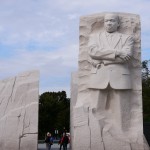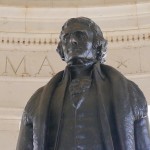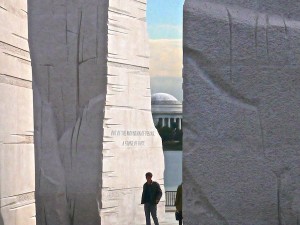Free At Last In Washington
Part 6, the capitol grounds
 In a time of militant religiosity, when “God Bless America” is the standard ending of most political speeches, it was encouraging to visit the Martin Luther King Jr. memorial, Washington’s newest. There is no “God” in the 14 quotations approved by his family to be cut in white stone. How do you explain a memorial to a powerful minister that does not mention God? Certainly he was not Godless, this man of peace, liberation and non-violence. Suddenly it occurred to me that the divine presence there on the edge of the Tidal Basin on the nation’s spacious capitol grounds is universal Humanity.
In a time of militant religiosity, when “God Bless America” is the standard ending of most political speeches, it was encouraging to visit the Martin Luther King Jr. memorial, Washington’s newest. There is no “God” in the 14 quotations approved by his family to be cut in white stone. How do you explain a memorial to a powerful minister that does not mention God? Certainly he was not Godless, this man of peace, liberation and non-violence. Suddenly it occurred to me that the divine presence there on the edge of the Tidal Basin on the nation’s spacious capitol grounds is universal Humanity.
One quote of the Rev. Dr. King says:
“If we are to have peace on earth, our loyalties must become ecumenical rather than sectional. Our loyalties must transcend our race, our tribe, our class, and our nation. . . “
No, the absence of the word God there requires no apology. Rather, the quivering politicians should be asked to explain their use — and I mean use — of God. The slogan “God bless America” was invented during a time of war with God on our side. It is a declaration of patriotism, even an implicit directive to those who do not fear the Old Testament God.
“God Bless America” is a political cliche, a rote recitation. This is not Franklin Delano Roosevelt leading the nation in prayer on the radio at the outset of the Normandy invasion. This is not Robert E. Lee sending his surrendered soldiers home with the words:
“You will take with you the satisfaction that proceeds from the consciousness of duty faithfully performed, and I earnestly pray that a Merciful God will extend to you his blessing and protection.”
This is not the plea of a “broken and a contrite heart” (Ps. 51) or praise for a God “who fashioneth their hearts alike” (Ps. 33) Why, If politicians are going to bring God into their campaigns, don’t they conclude their speeches with prayers for those who suffer — the “one third of a nation” in FDR’s perspective of solidarity (2nd Inaugural Address). Well, because that is too negative, too Jimmy Carterlike, not Morning In Americalike. Gloom loses elections.
In a town where a Texas Congressman who, after voting to shut down government including the National Park Service stood at a consequent barricade of the World War II Memorial and berated an young woman NPS ranger for not letting veterans pass, it is no surprise to see religious hypocrisy as well. It works.
Not all religiosity is hypocritical, of course. Not all inspired people are Pharisees. There are many, some intimately involved in government, who truly believe the end is near because the nation is not Christian enough. There is Dianne Reidy, an official stenographer for the House of Representatives who seized the rostrum microphone during the crucial roll-call vote that ended the Great Shutdown and began a broken rant before she was hauled away by security officers:
“He will not be mocked. This is not one nation under God. It never was. . . . “
“One nation under God” comes from the Pledge of Allegiance as amended by statute in 1954. It used to say, “One nation, indivisible, with liberty and justice for all.” The amendment made it say, “One nation, under God, indivisible, with liberty and justice for all.” As a kid I had trouble relearning the pledge because, to me, the insertion of God upset the meter. I wished they had taken out “indivisible” to keep the rhythm. And why not? The nation right now happens to be very divisible.
There has always been some constitutional argument about putting God in the pledge. One talking point for the amendment was that there is a precedent in the Gettysburg Address where Lincoln dreams “that this nation, under God, shall have a new birth of freedom.” Some scholars have countered that in his time “under God” meant “God willing,” not that this nation shall be ruled by God.
Perhaps it is no big deal. Three years ago the liberal Ninth Circuit Court of Appeals in San Francisco ruled that the words inserted in the pledge were of a “ceremonial and patriotic nature” and did not constitute an establishment of religion. (Newdow v. Rio Linda)
The courageous quotations on stone at the Martin Luther King Jr. memorial are consistent with the religious restraint of other monuments we saw on the grounds of America’s capitol, with one notable exception: the domed pavilion housing a statue of Thomas Jefferson. It is framed by the sharp stone structure of the King monument, whose his image faces it.
I supposed that King might have looked across the water and thought of freedom. His most famous speech ends with the words of a spiritual:
“Free at last, Free at last, Great God a-mighty, We are free at last.”
The inner rim of the Jefferson memorial has these words:
“I have sworn upon the altar of God eternal hostility against every form of tyranny over the mind of man.”
Slave holder and descendant of slaves: I don’t think their love of freedom is that different.
Jefferson said, “God who gave us life gave us liberty.” And, “Almighty God hath created the mind free.” To me these words on stone in Jefferson’s memorial are his solution to the conflict between religion and the scientific thinking of his time. It is a Deism concept of God that does not endorse divine favor to any one nation or people.
stone in Jefferson’s memorial are his solution to the conflict between religion and the scientific thinking of his time. It is a Deism concept of God that does not endorse divine favor to any one nation or people.
Spinoza and Locke, the 17th Century philosophers at the rise of science, argued against government that dictates what its subjects must believe, think, or say — government that, in effect, suppresses scientific thought. Both philosophers were in his library.
And the Declaration of Independence, which Jefferson wrote, begins with a statement of rights from “nature and nature’s God.” The God of Spinoza is Nature. This is the philosopher who was excommunicated by the rabbis, formally shunned, and nearly assassinated because of his thinking.
And so it was with some sense of gratitude to Jefferson and King that I visited the most popular museum in the world, the Smithsonian’s Air and Space Museum, where we took a tour guided by a bright and well informed volunteer, a docent who retired after 30 years as an engineer in order to teach high school. From the Wright Brothers to Apollo 11, he told the story of the 20th Century, the century of flight. With a digital tablet he played the words of the late Neil Armstrong: “The Eagle has landed.”
My Southern travel journal ends here. It began looking upward and quickly came down to earth and then, unexpectedly, bounced back to the heavens.


I loved reading this. Great writing and a wonderful synergy.
Here’s a little something of mine:
On the Death of Seamus Heaney
“As is the generation of leaves”
So says Homer
“Mankind –
When one falls
Another never fails to take its place”.
Appropriately,
Outside the window
Leaves are turning dry,
And a great poet
Is gone from this world.
Autumn has always been
The sweetest,
Crisp with regret
For failing summer,
Pungent with a sharp urgency of light
Before the fall’s diminishment.
I, too, grow old
In this now suitable sweetness.
But I have dared to eat a million peaches
By a million moons
Full with the fertile promise
Of summer’s wild abundance
That is waning now.
Yet filling in the darkness
Is a welling of experience
As fearless
As the riot of bright leaves
That rage
Before their journey to the earth.
E. Smith Dunlap 2 Sept 2013